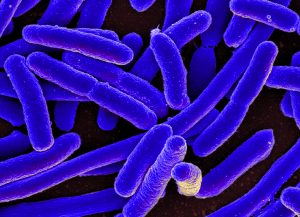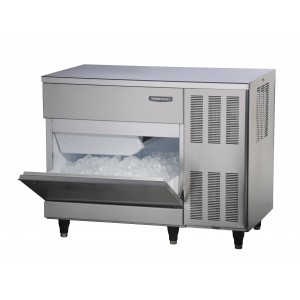
In light of recent reports released by ice machine manufacturer Ice-O-Matic, a staggering 40% of operators acknowledge that they are unaware of the regularity with which they clean their ice machine. Even more worrying is that they aren’t entirely certain how often they should be cleaning their equipment.
While all other aspects of the business are hygienically maintained to strict high standards, the inconspicuous and seemingly often overlooked ice machine seems to be suffering. Strange considering the presence of media stories surrounding big foodservice industry names being hit with icy scandals involving increasing levels of bacteria being found in the cubes being served to customers.
Canny, food safe operators would never dream of neglecting the cleaning rota when it came to tasks such as scrubbing the cooker, changing oil in the fryer or deep cleaning refrigeration. Ice machines need TLC just as much as any other piece of commercial equipment; after all they are technically another food production unit like any other.
Can Bacteria Live in Ice Cubes?

This impending presence of bacteria is why regular cleaning of ice machines is essential. Businesses may start out with good intentions but they can easily fall by the wayside with regards to cleaning and maintenance once things get busy or at the end of a long service.
How Often Should an Ice Machine Be Cleaned?
There’s varying advice on the frequency that a commercial ice machine should be cleaned. It will often depend on the level of usage and the water condition in each area. Manufacturers will recommend cleaning regularity based their equipment however this should be treated as a minimum guide; the actual amount required to guarantee hygienic operation will usually be more.
We recommend cleaning once a week preferably at the end of the night when ice isn’t required.
Remember that it’s not just about waging war against bacteria but also eliminating any build-up of harmful slime or mould that naturally occurs when air is drawn into the equipment during operation.
Never wait for negative signals such as soft, malformed, cloudy cubes or a distinct aroma before cleaning. If any of these occur it will generally mean cleaning is already overdue. Stick to a strict timetable to remain proactive rather than reactive.
How to Clean an Ice Machine
Manufacturers always include cleaning instructions and recommendations with every piece of equipment, highlighting the importance of keeping ice makers clean, however advice in some cases, just isn’t being taken. Be sure to read all relevant literature to achieve the best results. If manuals are missing get in touch with the supplier who should be able to provide what’s needed.
*Please Note: The following is intended as a guide only; manufacturers cleaning instructions will always supersede.
- Completely empty the machine and throw away any ice. Never reintroduce any ice that has been removed, even after cleaning is complete.
- If equipment has a cleaning cycle, run it now.
- Turn off the ice machine.
- Take out all components that can possibly be removed.
- Clean all interior and exterior surfaces including bins with sanitiser. Follow the instructions on the bottle for the permitted amount to water ratio. Never use chemicals that could contaminate ice.
- Rinse and dry all surfaces thoroughly.
- Remember to pay attention to the drainage system; anywhere there's water there's a potential for bacteria build-up.
- Clean all components including scoops etc. in sanitiser. Alternatively run pieces through the commercial dishwasher for cleaning at hotter temperatures (commercial dish washers must complete a final rinse at a minimum of 82°C). While cold doesn’t kill bacteria, heat will.
- Clean the condenser air filter removing any dust or dirt build-up. It makes sense to carry out a little maintenance whilst doing the cleaning.
- Reassemble all components and switch on the machine to create a fresh batch of ice ready for the next day.
Other Top Tips
There are other aspects to be addressed and best practises that can be put in place to ensure that ice supplies are always clean. In addition to regular cleaning and maintenance, try employing these steps aimed at encouraging advanced levels of hygiene, ensuring that schedules are adhered to and the cleaning process is easier to follow.
- Make sure hands are clean

- Always use a sanitised scoop – never a glass or hands
- Create a cleaning schedule with a simple checklist of step by step instructions
- Make sure all staff have appropriate training in good cleaning practises
- Educate staff about the importance of comprehensive cleaning
- It’s essential to carry out regular servicing at least once a year in addition to regular cleaning
It Isn’t Just Pubs and Restaurants
It’s not only pubs and restaurants that need to adhere to strict cleaning regimes with regards to ice machines. Any business that deals with some form of catering should take heed. Educational establishments, canteens or correctional facilities will often have an ice machine on the premises that requires the same level of attention as those in restaurants or bars. Hospitals also place a high priority on the cleanliness of ice machines, even issuing guidelines surrounding cleaning, maintenance and best practise for use of ice machines within the NHS. With patients often more susceptible to bacteria it’s vital to their well-being that effective measures are taken to ensure outstanding levels of cleanliness and hygiene are maintained in every aspect.
For more information regarding ice machines get in touch with the FFD team today who will be more than willing to help.
*Since publication, BBC's Watchdog have reported the discovery of high bacteria levels in ice following an investigation in to leading pub chains. Surely this is a signal that pub and bar operators need to address the cleaning and maintenance regimes of their ice machines and realise that ice relies just as much on food safety as other aspects of a commercial kitchen.


Leave a Comment
Your email address will not be published. Required fields are marked *